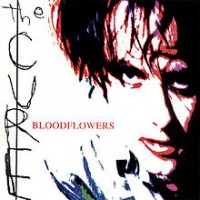"When we look back on it all as I know we will / You and me wide-eyed / I wonder will we really remember / How it feels to be this alive? / And I know we have to go I realize / We only get to stay so long / We always have to back to real lives / Where we belong."
Quoted above are the first two stanzas of "Out of This World," the first song off of what was intended to be the Cure's farewell album, Bloodflowers. After 1996's crushingly disappointing Wild Mood Swings (not to mention 1992's slightly disjointed Wish), frontman Robert Smith was about ready to check out on the Cure once and for all. That attitude ended up freeing Smith's songwriting--Bloodflowers unquestionably sounds like it was supposed to be a good send-off.
Much more subdued and spacey, it hearkens back to Disintegration. And that's not just me trying to oversell the album; Bloodflowers was also meant to conclude the Cure's "Dark Trilogy," which consisted of the nihilistic Pornography and the atmospheric, lovelorn Disintegration. While the band's '90s psychedelic guitar squalls show up on tracks like "Watching Me Fall" and "Bloodflowers," for the most part, the album is an attempt to grow old gracefully, to put on one last good show. Obviously, this didn't happen, since the Cure has (to date) released two more studio albums since then. Still, though, Bloodflowers stands as the delayed last great Cure album.
Some squabble over its place in the trilogy, as Bloodflowers came out 11 years after its predecessor. Plus, Seventeen Seconds, Faith and Pornography form a more stylistically consistent triad anyway. But whether it was a sincere artistic effort or merely an advertising bullet point, the record remains a shining entry in the group's discography, and perhaps one of their most underrated.
At just nine tracks, the album is about as lean as an epic, moody goth record can be. "Watching Me Fall" sucks up a lot of time at 11 minutes, but it's one of those tunes that goes from good to boring to great by the time Smith hits that last howl. It's still kind of the odd man out, though, as the closing title track has a more intense feel, carrying a sense of finality in its concluding notes. But Bloodflowers is arguably better celebrated for its quieter moments anyway.
"Out of This World" begins the record on a soft, somber note, guided by a twinkling piano line and Smith's nostalgia. "Where the Birds Always Sing" and "Maybe Someday" add some pop to the space-rock. Plenty of the lyrics on this record have a sense of resignation to them. Sometimes it plays off in anti-love songs like "The Loudest Sound," and sometimes it carries this sense of nihilism to it. Lines like "I used to feed the fire," from "39," and "The world is neither fair nor unfair," from "Birds," don't quite match Pornography's insistence that "It doesn't matter if we all die," but they come close.
While I personally enjoy follow-ups The Cure and 4:13 Dream, they don't quite possess the cohesion and vibe that mark Bloodflowers as a truly great record. I'm not worried about Smith writing another "Just Like Heaven," but 11 years on, I am worried about ever getting another Bloodflowers.
